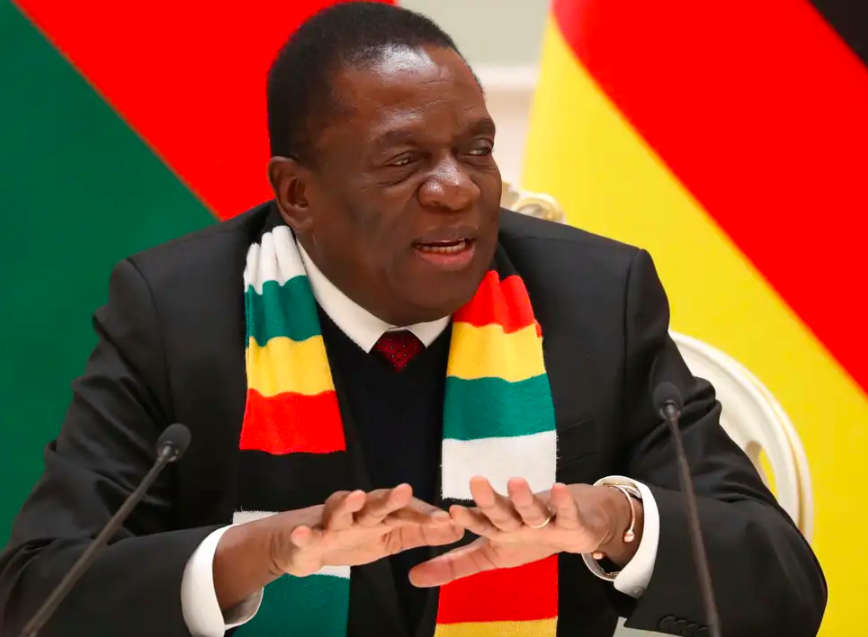Zimbabwean President says sale of ivory stocks could fund conservation for 'next 20 years'
The Head of State spoke at the inaugural African Wildlife Summit, reports Antoaneta Roussi

Your support helps us to tell the story
From reproductive rights to climate change to Big Tech, The Independent is on the ground when the story is developing. Whether it's investigating the financials of Elon Musk's pro-Trump PAC or producing our latest documentary, 'The A Word', which shines a light on the American women fighting for reproductive rights, we know how important it is to parse out the facts from the messaging.
At such a critical moment in US history, we need reporters on the ground. Your donation allows us to keep sending journalists to speak to both sides of the story.
The Independent is trusted by Americans across the entire political spectrum. And unlike many other quality news outlets, we choose not to lock Americans out of our reporting and analysis with paywalls. We believe quality journalism should be available to everyone, paid for by those who can afford it.
Your support makes all the difference.Zimbabwe’s President Emmerson Mnangagwa has called for multilateral treaties such as CITES (the Convention on International Trade in Endangered Species of Wild Fauna and Flora) to promote a balance between conservation and sustainable use of natural resources, saying he was “gravely concerned” that the banning of trade of wildlife products was creeping into CITES decision-making processes.
President Mnangagwa, who made the announcement at the inaugural African Wildlife Economy summit 23-25 June in Victoria Falls, Zimbabwe, said that his country was sitting on $600 million worth of ivory and rhino horn. According to the President, the revenue that could be generated from the stocks - obtained at the natural death of animals- if trade of the products was legalised, would fund the operational budget of Zimbabwe’s national parks for the next 20 years.
“We continue to call for the free trade in hunting products,” Mnangagwa said to a packed auditorium of heads of state, policymakers and international organisations. “Whether I like it or not, an elephant will die. The ivory product of that elephant is valuable, so let us find a model of trade.”
Wildlife is the single biggest revenue for Africa’s tourism, with the United Nations World Tourism Organisation stating that 80% of annual sales of trips to Africa were for wildlife watching. However, wildlife and biodiversity on the continent are becoming increasingly threatened by habitat loss, poaching, and a lack of funding for protection. Communities who live adjacent to wildlife also say that they have been largely excluded from both the conversation around, and the benefits of, a wildlife-based economy.
Patricia Awori, director of the Pan African Wildlife Conservation Network, an initiative that focuses on uniting wildlife activist groups in Africa, opposed the Zimbabwean government’s view stating that “too much time” was being spent talking about ivory and not enough on the communities living alongside wildlife.
“We need to be looking at ways to create livelihood opportunities for those communities’ to co-exist with wildlife and thrive, instead of focusing on stockpiles,” Awori said.
Botswana, Namibia, South Africa and Zimbabwe’s elephant populations are under CITES Appendix II, meaning that they are allowed to legally trade in ivory, subject to certain conditions. Since 1997 there have been two one-off sales of stockpiled ivory authorised by the CITES members, which in the 2008 sale, generated $15 million for 102 tonnes. The four governments are now asking to remove the CITES restrictions so that their African elephant populations be treated as any other Appendix II animals, not subject to restrictions.
Ivonne Higuero, secretary-general of CITES told The Independent that discussions related to African elephant populations were expected to take place at COP18 in Geneva later this year.
“Seeing the interest and need to develop nature-based solutions for sustainable development in Africa, including to achieve the UN SDGs, the cost of conservation and the needs of the communities that have been brought to light, it is essential for CITES to be the platform for these discussions and decision-making by the 183 Parties of the treaty,” she said.
Max Graham, CEO of Space for Giants, an international conservation organisation whose work The Independent supports, said that in the end, what lies behind most of these discussions was funding and the need to exploit “valuable economic assets.”
“Our research has found that there’s a huge untapped opportunity to expand tourism into Africa’s protected areas that could enormously increase the earnings governments can win from wildlife tourism,” he said. “That’s money that’s sustainably available year in year out, rather than once-off, it provides many, many jobs, and it drives national economies.”
The African Wildlife Summit is co-organised by the Zimbabwean government, African Union, and UN Environment.
Join our commenting forum
Join thought-provoking conversations, follow other Independent readers and see their replies
Comments